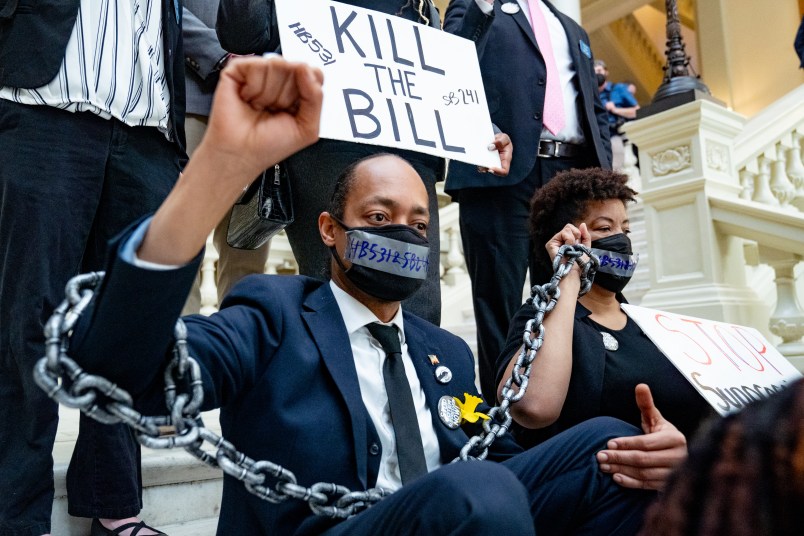Almost immediately after Georgia Gov. Brian Kemp (R) signed into law sweeping changes to the state’s election rules Thursday, Black community groups filed a lawsuit challenging several of its provisions, which the groups say are unconstitutional and a violation of the Voting Rights Act.
“The Voter Suppression Bill inflicts severe burdens on Georgia’s voters through each individual restriction and the cumulative effect of all the suppressive measures which impose barriers to voting absentee and in-person,” the lawsuit said.
The lawsuit is targeting nine specific measures within the new law, including the new ID requirements for mail voting, its limits on dropbox use and its ban on distribution of food and most beverages to voters waiting in line.
The groups bringing the lawsuit are The New Georgia Project, Black Voters Matter Fund and Rise, Inc., which focuses on student enfranchisement. The organizations are being represented by Marc Elias, a powerhouse voting rights attorney who also often represents Democrats.
The GOP-controlled legislature passed the law on Thursday after Georgia had been the primary target of President Trump’s lies about fraud in the 2020 election. Several of the most extreme proposals the Republicans were considering — such as an end to no-excuse absentee voting and a ban on Sunday in-person voting — did not make into the final legislation. And other aspects of the new law will expand voting opportunities for some counties, by raising the floor on the amount early in-person voting required.
Still, the other provisions that will place new hurdles in front of the ballot box are unjustified, the lawsuit argues, as the state election officials and even a top Republican legislative leader have confirmed that no fraud was found in the myriad reviews of the 2020 results.
The lawsuit is also challenging the bill’s restrictions on mobile voting units, which were used extensively by Atlanta-area voters in 2020, and its prohibition on election officials proactively sending out mail ballots to voters, as well as its ban on ballot collection efforts by third parties. Additionally, the lawsuit targets the provision green lighting an unlimited number of challenges to the eligibility of voters, as well as the law’s policy of limiting when a voter who shows up the wrong precinct can have his ballot counted. The law’s shortening of the run-off voting period is challenged as well.
“The Voter Suppression Bill interacts with these social conditions to deny or abridge the voting rights of Black Georgians, and to deny Black voters in Georgia an equal opportunity to participate in the electoral process and elect candidates of their choice,” the lawsuit said. “Protestors outside the Capitol recognized this, calling the Bill ‘Jim Crow 2.0.’ In fact, State Representative Park Cannon of Atlanta, a Black woman, was arrested by state troopers after knocking on Governor Kemp’s office door to try to witness the bill signing.”
Read the lawsuit below:







Yep. GOPs picked a fight. It’s on now.
And Exhibit 1 will be the video of the Black State Rep getting dragged off in handcuffs.
Talk about unleashing a kraken… They’ve done it now.
Stacey Abrams is gonna rock their racist world.
But if it goes to the SC, the law will stand, yes?